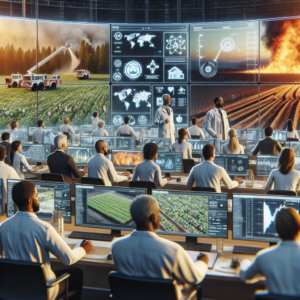If Anthropic Succeeds, a Nation of Benevolent AI Geniuses Could Be Born
As the world races towards an AI-driven future, one of the foremost discussions revolves around the impact of artificial intelligence on our societies. Among the key players in this transformative space is Anthropic, a research company on a mission to develop AI systems that align with human values and are beneficial for humanity. Their ambitious vision promises a future where a nation of benevolent AI geniuses could emerge, fundamentally changing our world. This blog post delves into the implications of Anthropic’s work and what it could mean for the future of AI.
The Vision of Anthropic
Anthropic’s primary goal is to create AI systems that are not only powerful but also safe and aligned with human intentions. This involves extensive research into the ethical implications of AI and the development of models that prioritize human well-being. The company’s founders, including former OpenAI employees, are determined to ensure that AI serves as a tool for enhancing human capabilities rather than posing risks.
Key Objectives of Anthropic
1. Safety and Alignment: The company is focused on developing AI that adheres to ethical standards and is aligned with human values.
2. Transparency: By making their research open and accessible, Anthropic aims to foster trust and understanding of AI technology.
3. Collaboration: They actively seek partnerships with other organizations to advance the field of AI safety and ethics.
4. Education: Anthropic is committed to educating the public about the potential and risks of AI technologies.
Potential Benefits of a Benevolent AI Society
If Anthropic’s vision comes to fruition, we could witness the emergence of a society where AI serves as a positive force, enhancing various aspects of human life. Here are some potential benefits:
1. Enhanced Decision-Making
AI systems that prioritize ethical considerations could assist in critical decision-making processes across sectors. From healthcare to finance, AI could provide insights that help humans make better-informed choices, ultimately improving outcomes.
2. Increased Efficiency
AI can automate mundane tasks, allowing individuals and organizations to focus on more strategic and creative endeavors. This increased efficiency could lead to significant productivity gains, benefiting economies and societies as a whole.
3. Personalized Education
With AI-driven educational tools, learning can be tailored to individual needs, helping students grasp concepts more effectively. This could democratize education, making high-quality learning resources accessible to everyone.
4. Enhanced Creativity
AI has the potential to augment human creativity by providing new perspectives and assisting in the creative process. From art and music to literature, AI could inspire new forms of expression and innovation.
The Challenges Ahead
While the vision of a benevolent AI society is enticing, it is not without challenges. The following hurdles must be addressed to ensure the safe deployment of AI technologies:
1. Ethical Concerns
The development of AI must be guided by ethics. Questions surrounding privacy, consent, and the potential for bias in AI algorithms need to be carefully examined. Anthropic’s focus on alignment is crucial to mitigating these risks.
2. Regulation and Governance
As AI technologies evolve, so must the regulatory frameworks that govern them. Policymakers must work collaboratively with AI researchers and technologists to create guidelines that ensure safety and ethical compliance.
3. Trust and Transparency
Building trust in AI systems is essential for widespread adoption. Transparency in how these systems operate and make decisions will help alleviate public concerns and foster acceptance.
4. Public Awareness and Education
Raising awareness about the benefits and risks of AI is vital in shaping public perception. Organizations like Anthropic play a crucial role in educating the public and demystifying AI technologies.
Conclusion: The Path Forward
The work being carried out by Anthropic and similar organizations is pivotal in shaping the future of AI. If successful, we could witness the rise of a society enriched by benevolent AI geniuses, enhancing our lives while adhering to ethical standards. However, it is essential for all stakeholders, including researchers, policymakers, and the public, to engage in ongoing discussions about the implications of AI and collaborate in ensuring its safe and beneficial development.
As we stand on the brink of an AI-driven future, it is imperative to remain vigilant and proactive in addressing the challenges and opportunities that lie ahead. The vision of a world where AI serves humanity’s best interests is not just an ambitious dream; it is a goal that requires commitment, collaboration, and an unwavering focus on ethical principles.
By fostering a culture of responsible AI development and prioritizing human values, we can harness the power of artificial intelligence to create a better, more equitable world. The potential is immense, and with the right approach, the future could indeed be bright for both humanity and AI.



